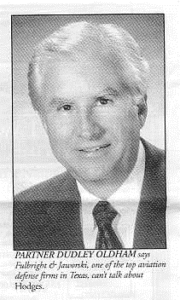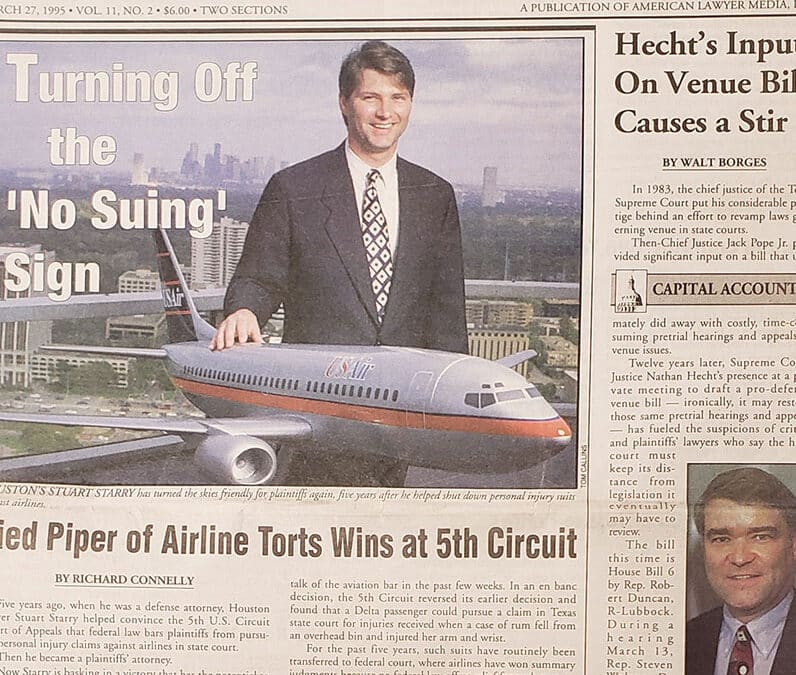BY RICHARD CONNELLY
Five years ago, when he was a defense attorney, Houston lawyer Stuart Starry helped convince the 5th U.S. Circuit Court of Appeals that federal law bars plaintiffs from pursuing personal injury claims against airlines in state court.
Then he became a plaintiffs’ attorney.
Now Starry is basking in a victory that has the potential to stir up a world of litigation against airlines. He convinced the 5th Circuit last month to overturn its earlier ruling – the one he had argued so strenuously for five years ago.
“I think it’s a case of perfect advocacy. I took the court and spun it 180 degrees,” said the brash 34-year-old, an associate at Houston’s Fleming, Hovenkamp & Grayson.
Starry was the plaintiff’s attorney in Hodges v. Delta Airlines, No. 91-6307, a Feb. 15 a ruling that has been the talk of the aviation bar in the past few weeks. In an en banc decision, the 5th Circuit reversed its earlier decision and found that a Delta passenger could pursue a claim in Texas state court for injuries received when a case of rum fell from an overhead bin and injured her arm and wrist.
For the past five years, such suits have routinely been transferred to federal court, where airlines have won summary judgments because no federal law offers relief for such personal injury claims.
Starry helped establish that standard chain of events when he won O’Carroll v. American Airlines, 863 F. 2d 11 (5th Cir. 1989). That decision established in case law the doctrine that the Airline Deregulation Act of 1978 broadly preempted state law claims against airlines. O’Carroll was expanded a year later in the unpublished opinion Baugh v. Trans World Airlines Inc.,
SEE LITIGATION, PAGE 30
30 TEXAS LAWYER, MARCH 27,1995
Litigation May Engulf Airlines
CONTINUED FROM PAGE I
915 F.2d 693 (5th Cir. 1990).
Both cases relied upon language in the deregulation act that said states could not regulate anything “relating to rates, routes or services” of airlines. Plaintiff’s attorneys argued the language was intended simply to bar states from re-regulating what the act had removed; defense attorneys, and the courts, interpreted the phrase “or services” more broadly.
Starry urged that broader interpretation when he was an aviation defense attorney with Houston’s Beirne, Maynard & Parsons. Three years ago, he switched sides and joined Fleming, Hovenkamp, then began looking for a case to take through the appeals process and overturn his earlier efforts.
“I was hired with the express purpose of overturning this law,” he said. “Aviation is the bread and butter of this firm; [Hodges] is a case we selected through a network of referral attorneys.”
Starry insists he is not the epitome of the lawyer who answers the question “How much is two plus two?’ with “How much do you want it to be?”
“At the time [of O’Carroll], I truly believed that the preemption was meant to be broad,” he said. ‘But I hadn’t read the entire legislative history. Since then, Baugh and O’Carroll have been used to get almost any case preempted.
“It’s been horrible for consumers for the past five years – the airlines won’t pay you anything, and they’ll pop you right away with a motion to remove to federal court and then get it dismissed. Legitimate cases were getting dismissed right and left.”
The litigation that might be open to state claims now would include suits where passengers were injured aboard a plane or while getting on or off it, or passengers who suffered from food poisoning or experienced ear damage from sudden drops in air pressure.
“I defended a lot of ear cases,” Starry said.
Hoff, immediate past president of the Aviation Insurance Association and a member of the Defense Research Institute’s aerospace committee, said he had viewed the pre-emption rulings as “an aberration” that would eventually be overturned.
He added that defense lawyers in Texas cannot be thrilled about the prospect of facing more state-court suits. “Texas has an awful reputation nationwide for its give- away, big-lotto verdicts,” he said. “Any defense lawyer would rather be in federal court.”
The concurrence and dissent in Hodges also indicate that results are not so clear-cut. A concurrence — in the result, but not the reasoning — by Judge E. Grady Jolly says the ruling “promises uncertain and inconsistent results.”
The dissent, written by Judge Patrick Higginbotham and joined by Judge Emilio Garza, found that stowing carry-on luggage is a “service” and is thus preempted.
The majority opinion was written by Judge Edith Jones and joined by 11 of her colleagues. In it, she said that a claim similar to that in O’Carroll — in which a passenger won $260,000 in damages in state court for being removed from a plane for drunkenness — could still be preempted by the deregulation act, because it clearly involved “services.” But, Jones’ opinion said, the 5th Circuit panel decision in Baugh went too far when it broadened the definition of “services” to a case where a flight attendant broke a passenger’s ankle by stepping on her foot.
FULBRIGHT READS THE SIGNS
Starry is not the only plaintiffs’ attorney who sees a widespread impact from Hodges. Grant Gealy, a partner in the Houston office of Galveston’s Mills, Shirley, Eckel & Bassett, has a similar case pending before the Texas Supreme Court.
Continental Airlines is appealing an August 1994 1st Court of Appeals ruling where a divided panel said state courts need not follow 5th Circuit rulings when they find the decisions of other circuits to be better reasoned.
In his Supreme Court brief in Continental Airlines v. Keifer, No. 94-1143, Gealy doesn’t rnince words: “Continental contends it was Congress’ intent in the Deregulation Act to shield the airline industry from financial responsibility for killing or maiming the traveling public. In other words, a certificated air carrier has a license to kill without accountability to the victim’s family.”
Kiefer involves a woman injured when a briefcase fell on her head from the over- head bin.
Gealy said Continental’s lawyers at Houston’s Fulbright & Jaworski apparently anticipated Baugh would be overturned and did not cite it in their briefs.
“Fulbright saw the writing on the wall when Hodges was granted the motion for a rehearing en banc,” he said. “They’ve briefed it to the nth degree to argue it without citing Baugh.”
Continental’s lead attorney on appeal, Jennifer Hogan, a participating partner in Fulbright & Jaworski, did not return phone calls. Fulbright handles much of the aviation defense work in Texas; partner Dudley Oldham said firm members could not comment on Hodges or Kiefer because they are pending litigation.
William Maynard, Starry’s supervisor at his old firm, said he was too busy when contacted for an interview and did not call back by press time March 23.
The 5th Circuit opinion in Hodges did go to some pains to discourage the suit that surely has been contemplated, at least momentarily, by every lawyer who has been bumped from a flight: “Under … the analysis advanced here, it is difficult to see how a lawsuit for overbooking would not ‘relate to’ the airline’s contract for ‘services’ with its passenger,” and thus be pre- empted, said the majority opinion.
“Texas has an awful reputation nationwide
for its give-away, big lotto verdicts.
Any defense lawyer would rather be in federal court.”
— CHICAGO’S JOHN S. HOFF
JOHN S. HOFF & ASSOCIATES
He said a suit his firm is currently handling from the September USAir crash near Pittsburgh had been removed from state court in Houston; he now has a motion pending to return it from federal court.
Defense attorneys are not so sure about how far-reaching Hodges will be.
“I don’t think it will be the landmark or the panacea that a lot of plaintiffs’ lawyers think it will be,” said Ron Sprague, a name partner in San Antonio’s Gendry & Sprague. “It’s always been a gray area as to what’s preempted or not. You end up doing a lot of litigation in state court knowing that the only remedy is to take it up on appeal to federal court, so you end up settling and the case goes away.”
Sprague, whose past and present clients include Delta and TWA, said he routinely sought to remove cases to federal court and still would do so – if not on the grounds that the deregulation act pre-empts such suits, then on diversity arguments.
“Hodges closes one door, but there are others,” he said.
An aviation defense expert in Chicago agreed. Defense lawyers will still try desperately to get their cases to federal court but might find that more difficult, said John S. Hoff of Chicago’s John S. Hoff & Associates.
“Have defense lawyers been robbed of a tactic? No question about it, but hopefully there are other things we can keep in our quiver of arrows to neutralize the op- position,” he said.
Hoff, immediate past president of the Aviation Insurance Association and a member of the Defense Research Institute’s aerospace committee, said he had viewed the pre-emption rulings as “an aberration” that would eventually be overturned.
He added that defense lawyers in Texas cannot be thrilled about the prospect of facing more state-court suits. “Texas has an awful reputation nationwide for its give- away, big-lotto verdicts,” he said. “Any defense lawyer would rather be in federal court.”
The concurrence and dissent in Hodges also indicate that results are not so clear-cut. A concurrence — in the result, but not the reasoning — by Judge E. Grady Jolly says the ruling “promises uncertain and inconsistent results.”
The dissent, written by Judge Patrick Higginbotham and joined by Judge Emilio Garza, found that stowing carry-on luggage is a “service” and is thus preempted.
The majority opinion was written by Judge Edith Jones and joined by 11 of her colleagues. In it, she said that a claim similar to that in O’Carroll — in which a passenger won $260,000 in damages in state court for being removed from a plane for drunkenness — could still be preempted by the deregulation act, because it clearly involved “services.” But, Jones’ opinion said, the 5th Circuit panel decision in Baugh went too far when it broadened the definition of “services” to a case where a flight attendant broke a passenger’s ankle by stepping on her foot.
FULBRIGHT READS THE SIGNS
Starry is not the only plaintiffs’ attorney who sees a widespread impact from Hodges. Grant Gealy, a partner in the Houston office of Galveston’s Mills, Shirley, Eckel & Bassett, has a similar case pending before the Texas Supreme Court.
Continental Airlines is appealing an August 1994 1st Court of Appeals ruling where a divided panel said state courts need not follow 5th Circuit rulings when they find the decisions of other circuits to be better reasoned.
In his Supreme Court brief in Continental Airlines v. Keifer, No. 94-1143, Gealy doesn’t rnince words: “Continental contends it was Congress’ intent in the Deregulation Act to shield the airline industry from financial responsibility for killing or maiming the traveling public. In other words, a certificated air carrier has a license to kill without accountability to the victim’s family.”
Kiefer involves a woman injured when a briefcase fell on her head from the over- head bin.
Gealy said Continental’s lawyers at Houston’s Fulbright & Jaworski apparently anticipated Baugh would be overturned and did not cite it in their briefs.
“Fulbright saw the writing on the wall when Hodges was granted the motion for a rehearing en banc,” he said. “They’ve briefed it to the nth degree to argue it without citing Baugh.”
Continental’s lead attorney on appeal, Jennifer Hogan, a participating partner in Fulbright & Jaworski, did not return phone calls. Fulbright handles much of the aviation defense work in Texas; partner Dudley Oldham said firm members could not comment on Hodges or Kiefer because they are pending litigation.
William Maynard, Starry’s supervisor at his old firm, said he was too busy when contacted for an interview and did not call back by press time March 23.
The 5th Circuit opinion in Hodges did go to some pains to discourage the suit that surely has been contemplated, at least momentarily, by every lawyer who has been bumped from a flight: “Under … the analysis advanced here, it is difficult to see how a lawsuit for overbooking would not ‘relate to’ the airline’s contract for ‘services’ with its passenger,” and thus be pre- empted, said the majority opinion.


Recent Comments